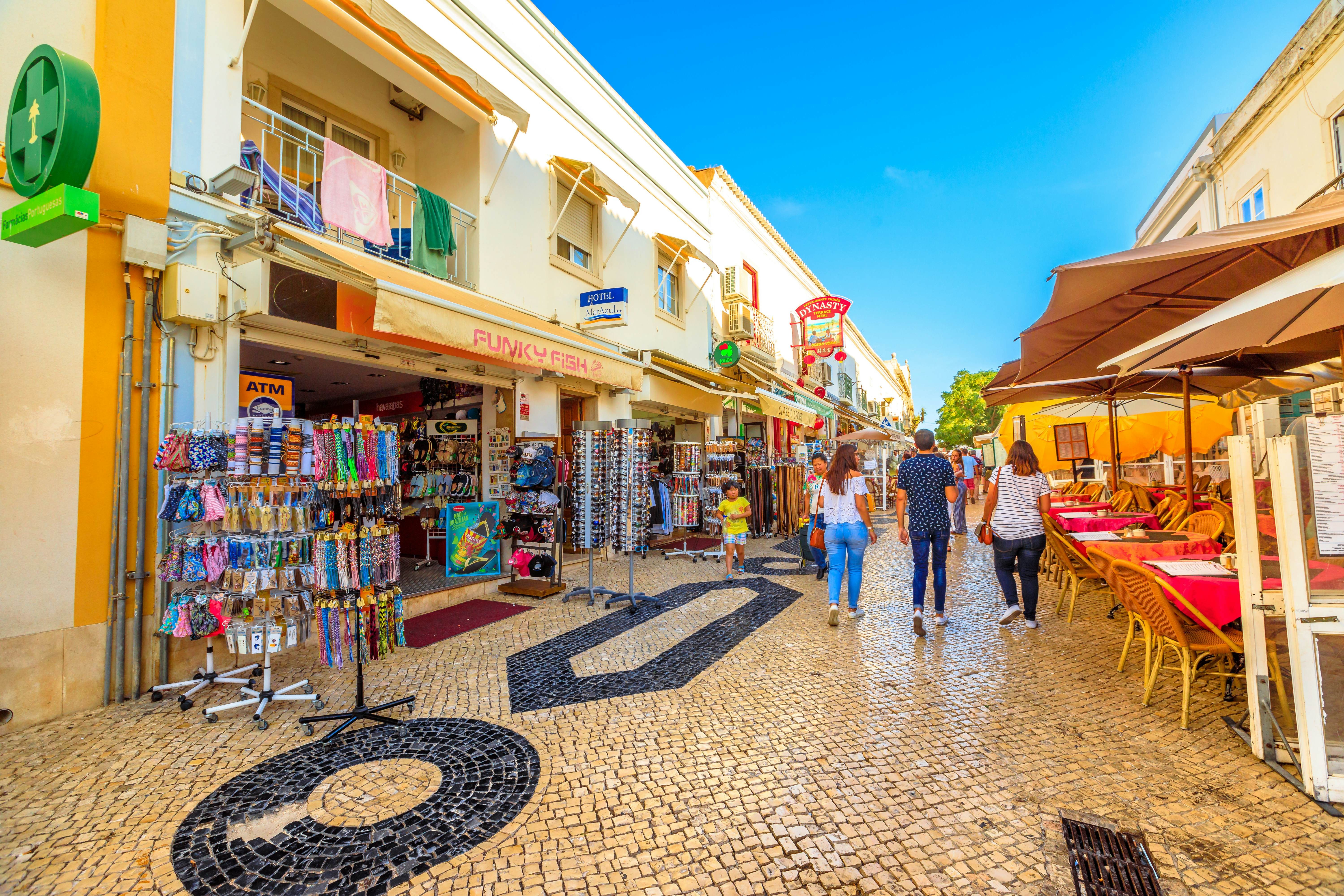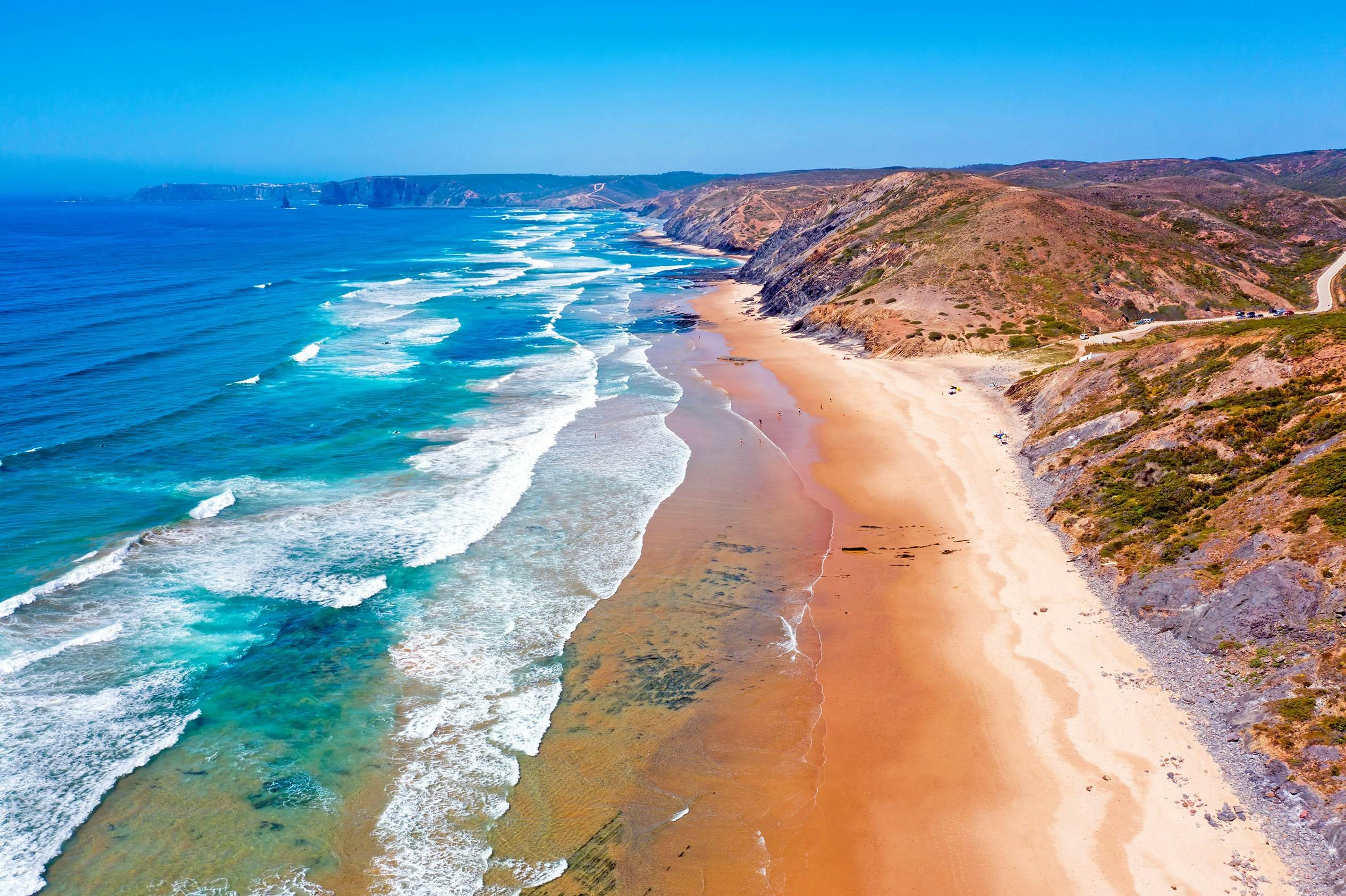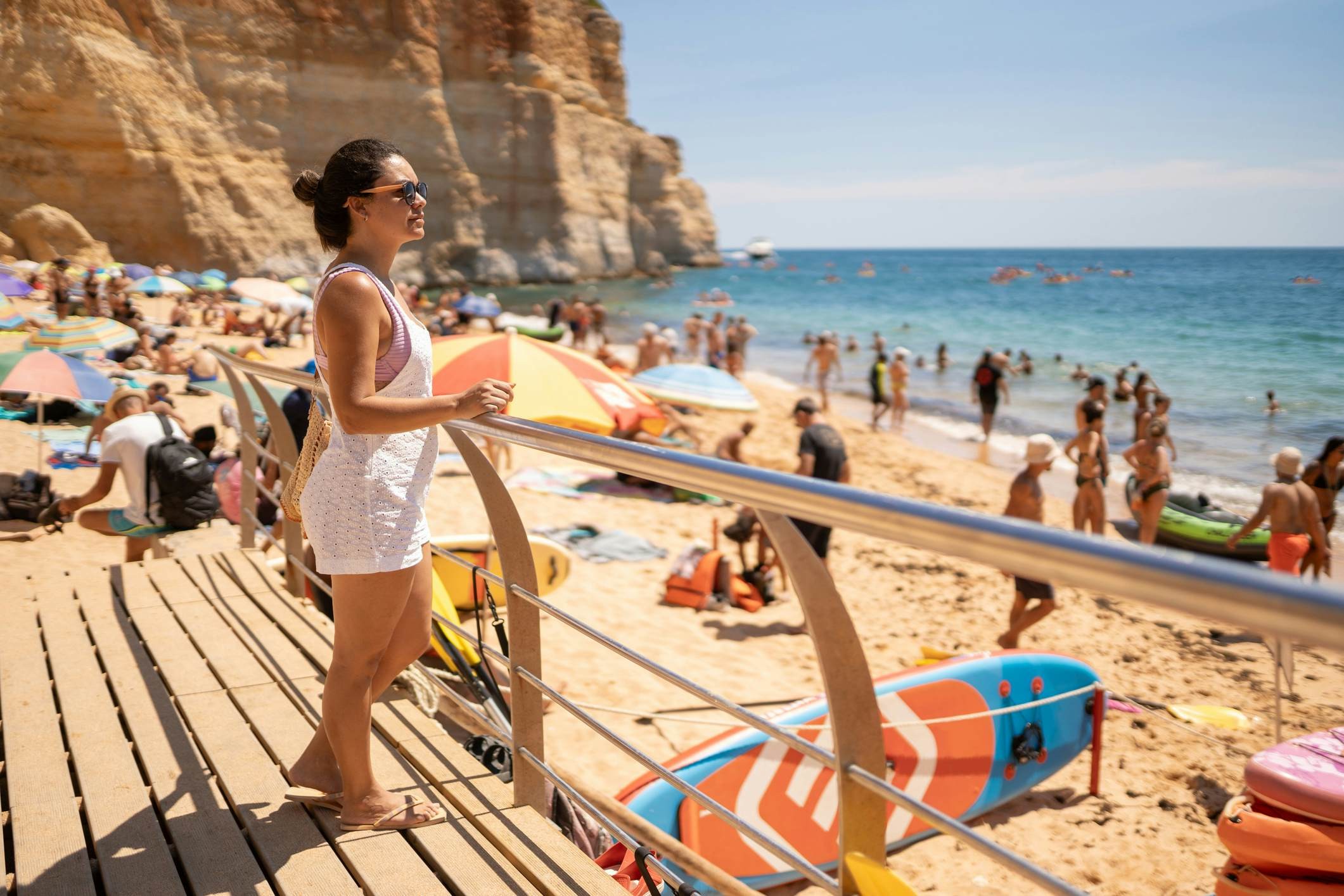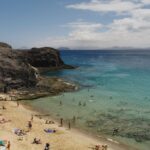The Algarve region in Portugal is exceptionally important for tourism due to its stunning beaches, diverse landscapes, and rich cultural heritage. SIXT.VN helps you unlock the best of this coastal paradise, providing seamless travel experiences with top-notch service and local expertise. Whether you’re seeking sun-soaked shores, thrilling water sports, or historical adventures, the Algarve promises an unforgettable escape.
Contents
- 1. What Makes the Algarve Region a Prime Tourist Destination?
- 2. How Does the Algarve’s Climate Influence Its Popularity?
- 3. What Are the Key Attractions and Activities in the Algarve?
- 4. How Does the Algarve Contribute to Portugal’s Economy Through Tourism?
- 5. What Role Do Cultural and Historical Sites Play in Algarve Tourism?
- 6. How Does the Algarve Compare to Other Tourist Regions in Portugal?
- 7. What Are the Environmental Concerns Related to Tourism in the Algarve?
- 8. How Can Sustainable Tourism Practices Be Promoted in the Algarve?
- 9. What Travel Tips Should Tourists Know Before Visiting the Algarve?
- 10. How Can SIXT.VN Enhance Your Travel Experience in the Algarve?
- FAQ About Tourism in the Algarve Region
1. What Makes the Algarve Region a Prime Tourist Destination?
The Algarve region stands out as a premier tourist destination because of its unique blend of natural beauty, cultural richness, and modern amenities. According to research from the Portugal National Tourist Office, in 2023, the Algarve attracted over 9 million tourists, making it one of the most visited regions in Portugal, thus providing significant economic benefits to the country. Let’s explore the key factors that contribute to its importance:
- Stunning Coastline: The Algarve boasts some of Europe’s most beautiful beaches, characterized by dramatic cliffs, golden sands, and crystal-clear waters. From the bustling Praia da Rocha to the secluded coves of Ponta da Piedade, there’s a beach for every preference.
- Pleasant Climate: With over 300 days of sunshine per year, the Algarve enjoys a Mediterranean climate ideal for outdoor activities year-round. Summers are hot and dry, while winters are mild and sunny, making it an attractive destination even during the off-season.
- Rich History and Culture: The region’s history is reflected in its charming towns and historic sites. Faro, the regional capital, features a picturesque old town with Roman and Moorish influences. Lagos, with its maritime history, offers insights into Portugal’s Age of Discovery.
- Diverse Activities: Whether you’re interested in water sports, golf, hiking, or exploring local markets, the Algarve has something for everyone. The region is renowned for its golf courses, attracting enthusiasts from around the world.
- Accessibility: With Faro Airport serving as a major international gateway, the Algarve is easily accessible from most European cities. The region also has well-developed road and rail networks, making it easy to explore.
- Culinary Delights: The Algarve’s cuisine is a major draw for food lovers. Fresh seafood, including grilled sardines and cataplana (a traditional seafood stew), are local specialties. The region also produces excellent wines and pastries, adding to the culinary experience.
The Algarve’s unique combination of natural beauty, cultural heritage, and modern amenities makes it a must-visit destination. With SIXT.VN, you can explore the Algarve’s hidden gems and popular attractions with ease and comfort, ensuring a memorable travel experience.
2. How Does the Algarve’s Climate Influence Its Popularity?
The Algarve’s climate plays a crucial role in its popularity as a tourist destination. According to data from the Portuguese Institute for Sea and Atmosphere (IPMA), the Algarve averages over 3,000 hours of sunshine per year, contributing to its appeal for sun-seekers, thereby enhancing tourism opportunities. Here’s a detailed look at how the climate impacts tourism:
- Year-Round Sunshine: The abundance of sunshine is a major draw, particularly for visitors from Northern Europe. Even in the winter months, the Algarve enjoys mild temperatures and plenty of sunshine, making it a popular destination for those seeking a warm escape.
- Ideal Beach Weather: The hot, dry summers provide perfect conditions for enjoying the Algarve’s stunning beaches. The sea temperatures are also warm enough for swimming from late spring to early autumn.
- Outdoor Activities: The pleasant climate encourages a wide range of outdoor activities, including golf, hiking, cycling, and water sports. The region’s golf courses are particularly popular during the shoulder seasons (spring and autumn) when the weather is mild and the crowds are smaller.
- Extended Tourist Season: Unlike many other European destinations that are primarily summer destinations, the Algarve enjoys an extended tourist season thanks to its mild winters. This helps to support the local economy and ensures that visitors can experience the region’s attractions without the peak-season crowds.
- Health Benefits: The warm, sunny climate is also seen as beneficial for health and well-being. Many visitors come to the Algarve seeking relief from cold weather or to enjoy the therapeutic effects of the sun and sea air.
The Algarve’s climate is a significant factor in its appeal as a tourist destination. With SIXT.VN, you can plan your visit to take full advantage of the region’s sunny weather and enjoy a range of outdoor activities.
3. What Are the Key Attractions and Activities in the Algarve?
The Algarve offers a diverse range of attractions and activities that cater to different interests. According to a survey by the Algarve Tourism Association, beaches are the primary attraction for 70% of visitors, while cultural and historical sites are also gaining popularity, reflecting a growing interest in the region’s heritage. Here’s a breakdown of the key attractions:
- Beaches:
- Praia da Marinha: Known for its stunning cliffs and crystal-clear waters, often ranked among the most beautiful beaches in the world.
- Praia do Camilo: A picturesque beach accessible via a wooden staircase, offering breathtaking views.
- Praia da Rocha: A lively beach with plenty of amenities, including restaurants, bars, and shops.
- Historical Sites:
- Faro Old Town: A charming historic center with Roman and Moorish influences, featuring the Faro Cathedral and the Municipal Museum.
- Lagos: A historic town with a rich maritime past, including the Ponta da Piedade cliffs and the Lagos Fortress.
- Silves: The former Moorish capital of the Algarve, with a well-preserved castle and historic architecture.
- Natural Parks:
- Ria Formosa Natural Park: A lagoon system with islands, beaches, and diverse birdlife, ideal for birdwatching and nature walks.
- Southwest Alentejo and Vicentine Coast Natural Park: A rugged coastal park with dramatic cliffs, wild beaches, and hiking trails.
- Water Activities:
- Boat Tours: Explore the coastline, visit sea caves, and spot dolphins.
- Surfing: The Algarve’s west coast offers excellent surfing conditions, particularly around Sagres and Carrapateira.
- Diving and Snorkeling: Discover the underwater world with its diverse marine life.
- Golf Courses:
- Monte Rei Golf & Country Club: One of the top-rated golf courses in Europe.
- Quinta do Lago: A luxury resort with several world-class golf courses.
- Vale do Lobo: Another popular golf destination with stunning ocean views.
- Culinary Experiences:
- Seafood Restaurants: Enjoy fresh seafood dishes like grilled sardines, cataplana, and seafood rice.
- Wine Tasting: Visit local wineries and sample the region’s wines.
- Local Markets: Explore the vibrant markets and sample local produce.
With SIXT.VN, you can easily access these attractions and activities, ensuring a well-rounded and unforgettable experience in the Algarve.
 People walking in Lagos, Portugal, a popular summer destination.
People walking in Lagos, Portugal, a popular summer destination.
4. How Does the Algarve Contribute to Portugal’s Economy Through Tourism?
Tourism is a significant contributor to Portugal’s economy, and the Algarve plays a central role in this. According to data from the Bank of Portugal, tourism accounts for approximately 15% of Portugal’s GDP, with the Algarve being one of the top-performing regions. Its economic impact can be seen in several key areas:
- Revenue Generation: The Algarve generates substantial revenue through accommodation, food and beverage services, transportation, and recreational activities. This income supports local businesses and employment.
- Job Creation: The tourism industry is a major employer in the Algarve, providing jobs for locals in hotels, restaurants, tour operators, and other related services. This helps to reduce unemployment and improve living standards.
- Investment Attraction: The success of the tourism industry has attracted significant investment in the Algarve, including new hotels, resorts, and infrastructure projects. This investment further boosts the local economy and creates new opportunities.
- Regional Development: Tourism helps to promote regional development by supporting local businesses and encouraging the preservation of cultural and natural resources. This can lead to improvements in infrastructure, public services, and quality of life.
- Export Earnings: Tourism is a major source of export earnings for Portugal, as foreign visitors bring in valuable currency. This helps to improve the country’s balance of payments and support economic growth.
- Multiplier Effect: The economic benefits of tourism extend beyond the direct impact on the tourism industry. The multiplier effect refers to the indirect and induced impacts of tourism spending on other sectors of the economy. For example, hotels purchase goods and services from local suppliers, and tourism employees spend their earnings in the local economy.
The Algarve’s contribution to Portugal’s economy through tourism is substantial and multifaceted. With SIXT.VN, you can support the local economy by choosing local services and experiences, ensuring that your visit has a positive impact on the region.
5. What Role Do Cultural and Historical Sites Play in Algarve Tourism?
Cultural and historical sites are integral to the Algarve’s tourism appeal, offering visitors a deeper understanding of the region’s rich heritage. The Algarve Tourism Board reports a growing interest in cultural tourism, with many visitors seeking authentic experiences and insights into local traditions. Here’s how these sites contribute to tourism:
- Attracting Diverse Tourists: Cultural and historical sites attract a diverse range of tourists, including history buffs, culture enthusiasts, and those seeking authentic experiences. This helps to broaden the appeal of the Algarve beyond beach tourism.
- Extending Tourist Season: Cultural and historical attractions can be enjoyed year-round, helping to extend the tourist season beyond the peak summer months. This is particularly important for attracting visitors during the shoulder seasons (spring and autumn).
- Preserving Heritage: Tourism revenue helps to support the preservation and restoration of cultural and historical sites, ensuring that they are maintained for future generations. This includes funding for museums, archaeological sites, and historic buildings.
- Promoting Local Identity: Cultural and historical sites help to promote local identity and pride by showcasing the region’s unique traditions, customs, and history. This can enhance the visitor experience and create a sense of connection to the local community.
- Educational Opportunities: These sites provide educational opportunities for visitors to learn about the Algarve’s history, culture, and natural environment. This can enhance their understanding and appreciation of the region.
- Enhancing Visitor Experience: By combining beach tourism with cultural and historical experiences, visitors can enjoy a more well-rounded and enriching vacation. This can lead to higher levels of satisfaction and repeat visits.
- Examples of Key Sites:
- Faro Cathedral: An iconic landmark with a mix of architectural styles, offering panoramic views of the city.
- Silves Castle: A well-preserved Moorish castle that provides insights into the region’s Islamic past.
- Lagos Slave Market: A historic site that serves as a reminder of Portugal’s role in the transatlantic slave trade.
- Roman Ruins of Milreu: Archaeological site showcasing the remains of a Roman villa.
Exploring these cultural and historical treasures with SIXT.VN allows you to delve into the Algarve’s past and experience its vibrant present.
6. How Does the Algarve Compare to Other Tourist Regions in Portugal?
The Algarve is one of Portugal’s most popular tourist regions, but it differs from other regions in several key aspects. According to data from the National Statistics Institute (INE), while the Algarve excels in beach tourism, other regions like Lisbon and Porto are known for their cultural and urban attractions, thereby diversifying Portugal’s tourism offerings. Here’s a comparison:
- Algarve vs. Lisbon:
- Algarve: Primarily known for its beaches, golf courses, and sunny climate. It attracts visitors seeking relaxation and outdoor activities.
- Lisbon: A vibrant capital city with a rich history, cultural attractions, and lively nightlife. It appeals to visitors interested in urban exploration, historical sites, and cultural experiences.
- Algarve vs. Porto:
- Algarve: Focuses on beach and resort tourism, with a more laid-back atmosphere.
- Porto: Known for its historic center (a UNESCO World Heritage Site), port wine cellars, and charming riverside district. It attracts visitors interested in culture, history, and gastronomy.
- Algarve vs. Madeira:
- Algarve: Characterized by its golden sandy beaches and warm Mediterranean climate.
- Madeira: An island known for its lush landscapes, dramatic cliffs, and unique flora and fauna. It appeals to nature lovers and hikers.
- Algarve vs. Azores:
- Algarve: Offers a more developed tourism infrastructure with a wide range of accommodation and services.
- Azores: An archipelago of volcanic islands known for its stunning natural beauty, including crater lakes, hot springs, and hiking trails. It attracts eco-tourists and adventure seekers.
- Key Differences:
- Climate: The Algarve has a consistently sunny and warm climate, while other regions may have more variable weather.
- Landscape: The Algarve is characterized by its coastline and beaches, while other regions offer more diverse landscapes, including mountains, forests, and vineyards.
- Tourism Focus: The Algarve primarily focuses on beach and resort tourism, while other regions offer a wider range of tourism products, including cultural, historical, and nature-based tourism.
Despite these differences, all these regions contribute to Portugal’s overall tourism success, each offering unique experiences and attractions. SIXT.VN provides tailored services to help you explore the best of each region, ensuring a memorable and personalized travel experience.
7. What Are the Environmental Concerns Related to Tourism in the Algarve?
While tourism brings many benefits to the Algarve, it also raises environmental concerns that need to be addressed. According to a report by the Portuguese Environment Agency, unsustainable tourism practices can lead to environmental degradation, resource depletion, and loss of biodiversity, hence the need for sustainable approaches. Here are some key concerns:
- Water Scarcity: The Algarve is a water-stressed region, and tourism can exacerbate water scarcity issues. Increased water consumption for hotels, golf courses, and swimming pools can put a strain on local water resources, particularly during the dry summer months.
- Coastal Erosion: Development along the coastline can contribute to coastal erosion, threatening beaches and natural habitats. Construction of hotels and other infrastructure can disrupt natural processes and increase the vulnerability of coastal areas to erosion.
- Waste Management: Increased waste generation from tourism can pose challenges for waste management systems. Improper disposal of waste can lead to pollution of land and sea, harming wildlife and degrading the environment.
- Habitat Destruction: Tourism development can lead to habitat destruction, as natural areas are cleared to make way for hotels, resorts, and other infrastructure. This can threaten biodiversity and disrupt ecosystems.
- Pollution: Tourism activities can generate pollution, including air pollution from transportation and water pollution from sewage and industrial discharges. This can harm human health and damage the environment.
- Traffic Congestion: Increased traffic from tourism can lead to congestion on roads and highways, particularly during the peak season. This can increase air pollution and contribute to climate change.
- Mitigation Strategies:
- Sustainable Water Management: Implementing water conservation measures in hotels and golf courses, promoting the use of recycled water, and investing in water-efficient technologies.
- Coastal Protection: Implementing coastal management plans to protect beaches and natural habitats, including restrictions on development in vulnerable areas.
- Waste Reduction: Promoting waste reduction and recycling initiatives, improving waste management systems, and encouraging tourists to reduce their waste.
- Habitat Restoration: Restoring degraded habitats and protecting natural areas from development.
- Sustainable Transportation: Encouraging the use of public transportation, cycling, and walking, and promoting the adoption of electric vehicles.
SIXT.VN is committed to promoting sustainable tourism practices and encourages travelers to make responsible choices that minimize their environmental impact.
8. How Can Sustainable Tourism Practices Be Promoted in the Algarve?
Promoting sustainable tourism practices in the Algarve is essential to ensure the long-term viability of the region’s tourism industry. The European Commission’s strategy for sustainable tourism emphasizes the importance of balancing economic, social, and environmental considerations. Here are several ways to promote sustainable tourism:
- Eco-Certification Programs: Encourage hotels, restaurants, and tour operators to obtain eco-certifications that demonstrate their commitment to sustainability. Certifications such as the Green Key and the Biosphere Responsible Tourism can help businesses to improve their environmental performance and attract eco-conscious travelers.
- Support Local Businesses: Encourage tourists to support local businesses, such as family-run restaurants, artisan shops, and local markets. This helps to boost the local economy and preserve cultural traditions.
- Promote Responsible Consumption: Encourage tourists to consume resources responsibly, such as using water and energy sparingly, reducing waste, and avoiding single-use plastics.
- Protect Natural Areas: Encourage tourists to respect natural areas and follow guidelines for responsible behavior, such as staying on marked trails, avoiding disturbing wildlife, and not littering.
- Sustainable Transportation: Promote the use of sustainable transportation options, such as public transportation, cycling, and walking. This can help to reduce traffic congestion and air pollution.
- Community Involvement: Involve local communities in tourism planning and development, ensuring that they benefit from tourism and have a say in how it is managed.
- Education and Awareness: Educate tourists and local residents about the importance of sustainable tourism and provide information on how they can make a positive impact.
- Government Policies: Implement government policies that support sustainable tourism, such as incentives for eco-friendly businesses, regulations to protect natural areas, and investments in sustainable infrastructure.
- Examples of Sustainable Initiatives:
- Algarve Green Business Program: Supports businesses in implementing sustainable practices.
- Ria Formosa Natural Park Sustainable Tourism Strategy: Aims to promote responsible tourism in the park.
- Eco-Friendly Accommodation: Hotels that have implemented energy-efficient technologies, waste reduction programs, and water conservation measures.
By embracing sustainable tourism practices, the Algarve can continue to thrive as a popular tourist destination while protecting its natural and cultural resources for future generations. SIXT.VN supports these initiatives by partnering with eco-conscious businesses and promoting responsible travel.
 Aerial view of ocean waves crashing on a beach
Aerial view of ocean waves crashing on a beach
9. What Travel Tips Should Tourists Know Before Visiting the Algarve?
Planning a trip to the Algarve can be an exciting experience, but it’s important to be well-prepared to make the most of your visit. Based on recommendations from seasoned travelers and local experts, here are some essential travel tips to keep in mind:
- Best Time to Visit: The best time to visit the Algarve is during the shoulder seasons (April-May and September-October) when the weather is pleasant, the crowds are smaller, and prices are lower. Summer (June-August) can be very crowded and hot.
- Transportation: Consider renting a car to explore the Algarve at your own pace. However, be aware that parking can be limited in some areas, especially during peak season. Public transportation, including buses and trains, is also available but may be less convenient for reaching remote areas.
- Accommodation: Book your accommodation in advance, especially if you’re traveling during the peak season. The Algarve offers a wide range of accommodation options, from budget-friendly hostels to luxury resorts.
- Currency: Portugal uses the Euro (€). Credit cards are widely accepted, but it’s always a good idea to have some cash on hand for smaller establishments and local markets.
- Language: Portuguese is the official language. While many people speak English in tourist areas, learning a few basic Portuguese phrases can be helpful and appreciated by locals.
- Dining: The Algarve is known for its delicious seafood, so be sure to try local specialties such as grilled sardines, cataplana, and seafood rice. Many restaurants close in the afternoon, so plan your meals accordingly.
- Safety: The Algarve is generally a safe destination, but it’s important to take precautions against petty theft, especially in crowded tourist areas. Keep your valuables secure and be aware of your surroundings.
- Beach Safety: Be aware of strong currents and tides when swimming in the ocean. Only swim at beaches with lifeguards and pay attention to warning flags.
- Sun Protection: Protect yourself from the sun by wearing sunscreen, a hat, and sunglasses. The sun can be strong, even on cloudy days.
- Local Customs: Be respectful of local customs and traditions. Dress modestly when visiting churches and other religious sites.
- Book in Advance: The Algarve’s growing popularity means some of the best places to stay get booked up months in advance. This is especially true if you’re traveling in the peak months of June through August. Once you have your itinerary organized, reserve your lodging. To secure a reservation at top restaurants, book at least a few weeks in advance (if you’re set on Vila Joya, it’s worth staying onsite, since hotel guests get priority for the limited restaurant seatings). If you’re not planning on dining at award winners, book a few days in advance, or around seven days ahead of time if planning a weekend reservation. The prime dining times are from 7 to 9pm.
- Pack Appropriately: You’ll get plenty of wear out of sandals, short-sleeve shirts and summer dresses in the Algarve. But things can cool off at night thanks to those delightful ocean breezes, so be sure to throw in a few warmer layers – even in July and August when average lows can drop to around 19ºC (66ºF). Although there aren’t any formal dress codes at restaurants, the Portuguese tend to dress up a bit at nicer places, so make sure you have the option to wear something smart-casual when leaving the tourist resorts.
- Gratuities: In the Algarve, you’ll find a wide range of dining options, including adegas (wine cellar-like eateries, that often serve wines straight from the cask), tascas (taverns), and easily recognizable restaurantes, which typically open for lunch and dinner only. Pastries are an artform in Portugal, and you should definitely visit the nearest pastelaria (pastry and cake shop) wherever you roam. The pastel de nata (custard tart) is one of many Portuguese delicacies worth experiencing.The appetizers aren’t free. Bread, cheese, olives and sometimes other appetizers are often brought to the table shortly after you sit down. These are called couvert, and they are never free. If you don’t want them, a polite “no thank you” (“não obrigado/não obrigrada” said by a man/woman) will see them sent back to the kitchen. Depending on the establishment, prices for couvert can range from €2 to €9 per person and upwards at pricier places.
With SIXT.VN, you can access these tips and plan your visit with confidence, ensuring a safe, enjoyable, and memorable experience in the Algarve.
10. How Can SIXT.VN Enhance Your Travel Experience in the Algarve?
SIXT.VN offers a range of services designed to enhance your travel experience in the Algarve, ensuring convenience, comfort, and peace of mind. According to customer feedback, SIXT.VN’s personalized service and local expertise significantly improve the overall travel experience in the region, thus fostering customer loyalty. Here’s how SIXT.VN can help:
- Airport Transfers: SIXT.VN provides reliable airport transfer services to and from Faro Airport, ensuring a smooth and stress-free arrival and departure.
- Car Rental: With SIXT.VN, you can rent a car to explore the Algarve at your own pace. Choose from a wide range of vehicles to suit your needs and budget, and enjoy the freedom to discover hidden gems and off-the-beaten-path destinations.
- Accommodation Booking: SIXT.VN offers a selection of hotels, resorts, and apartments in the Algarve, catering to different preferences and budgets. Book your accommodation through SIXT.VN for the best rates and a seamless booking experience.
- Tour Packages: SIXT.VN offers a variety of tour packages that showcase the best of the Algarve, including guided tours of historical sites, boat trips along the coast, and culinary experiences.
- Local Expertise: SIXT.VN’s team of local experts can provide insider tips and recommendations on what to see and do in the Algarve, helping you to discover the region’s hidden gems and authentic experiences.
- Customer Support: SIXT.VN offers 24/7 customer support to assist you with any questions or concerns you may have before, during, or after your trip.
- Personalized Service: SIXT.VN provides personalized service tailored to your individual needs and preferences, ensuring a memorable and stress-free travel experience.
- Convenience: SIXT.VN offers a one-stop-shop for all your travel needs, making it easy to plan and book your entire trip in one place.
By choosing SIXT.VN, you can enjoy a seamless and unforgettable travel experience in the Algarve, with the convenience of having all your travel needs taken care of.
 A woman wearing shorts and a vest looks out at the crowds on a beach in the sunshine
A woman wearing shorts and a vest looks out at the crowds on a beach in the sunshine
Ready to explore the stunning Algarve region? Don’t let the challenges of planning a trip hold you back. SIXT.VN offers comprehensive travel services, including personalized itinerary planning, convenient airport transfers, a wide selection of accommodations, and expertly guided tours. Contact us today to start planning your dream vacation and experience the best of the Algarve with ease and comfort. Visit SIXT.VN for exclusive deals and let us take care of all your travel needs.
Contact Information:
- Address: 260 Cau Giay, Hanoi, Vietnam
- Hotline/Whatsapp: +84 986 244 358
- Website: SIXT.VN
FAQ About Tourism in the Algarve Region
- What is the best time to visit the Algarve?
The best time to visit the Algarve is during the shoulder seasons (April-May and September-October) for pleasant weather and fewer crowds. - What are the main attractions in the Algarve?
The main attractions include stunning beaches like Praia da Marinha, historical sites in Faro and Lagos, and natural parks like Ria Formosa. - How does the Algarve contribute to Portugal’s economy?
The Algarve significantly contributes through tourism revenue, job creation, investment attraction, and regional development. - What are the environmental concerns related to tourism in the Algarve?
Key concerns include water scarcity, coastal erosion, waste management, habitat destruction, and pollution. - How can sustainable tourism practices be promoted in the Algarve?
Sustainable practices can be promoted through eco-certification programs, support for local businesses, responsible consumption, and government policies. - Is the Algarve a safe destination for tourists?
Yes, the Algarve is generally safe, but tourists should take precautions against petty theft and be aware of ocean currents. - What transportation options are available in the Algarve?
Options include rental cars, buses, trains, ride-sharing apps like Uber and Bolt. - What is the local cuisine like in the Algarve?
The Algarve is known for fresh seafood, including grilled sardines and cataplana. - What services does SIXT.VN offer in the Algarve?
SIXT.VN offers airport transfers, car rental, accommodation booking, tour packages, and local expertise. - How can SIXT.VN enhance my travel experience in the Algarve?
SIXT.VN provides personalized service, convenience, and local expertise to ensure a memorable and stress-free travel experience.





